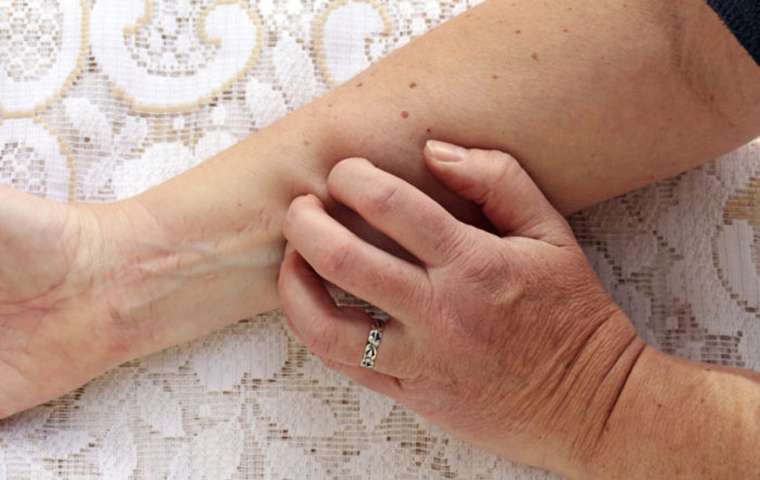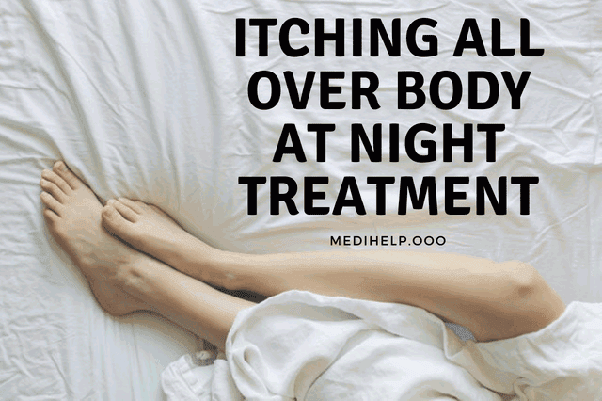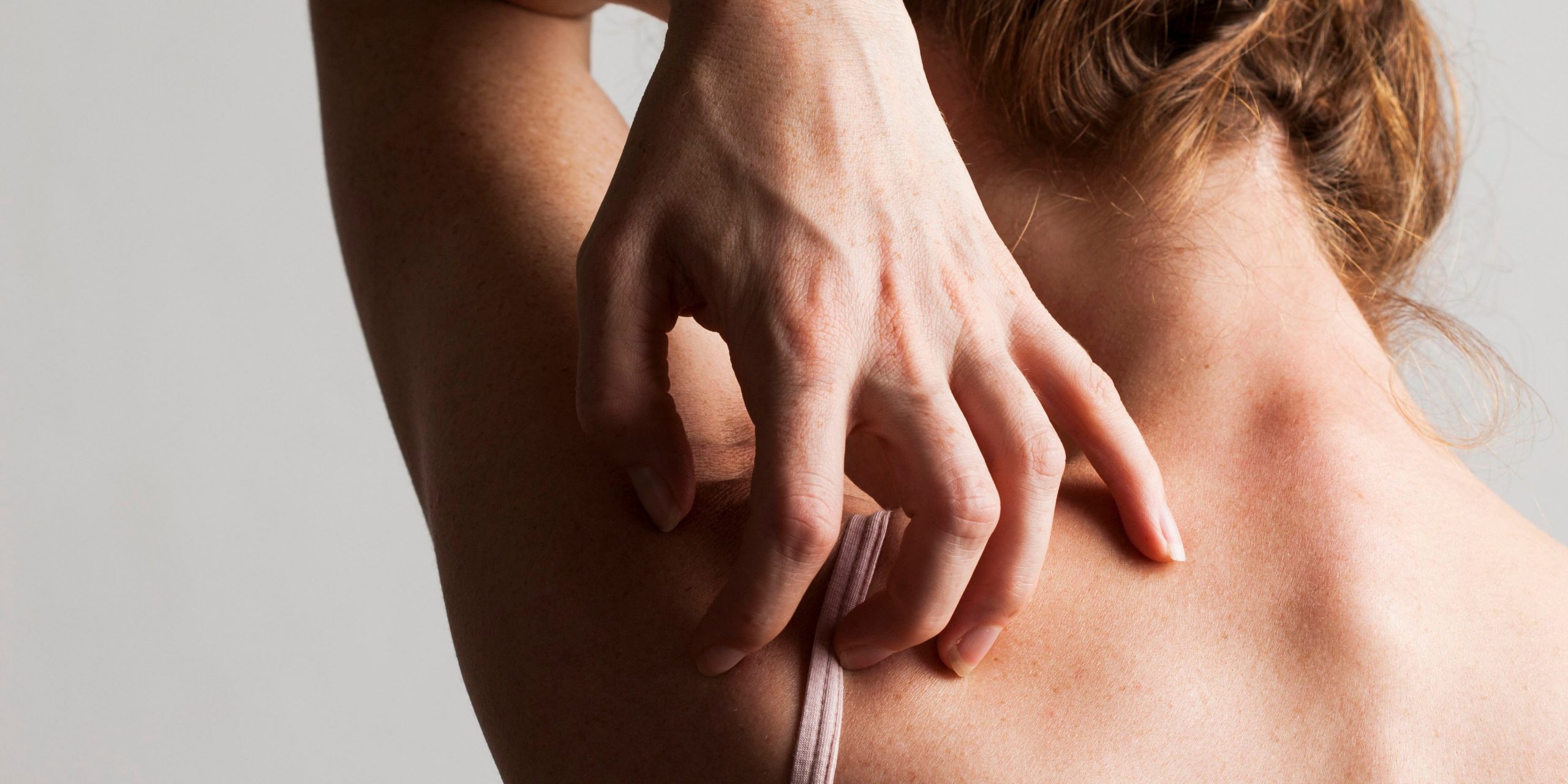How Diabetes Affects Skin
Diabetes can have an impact on the health of skin in multiple ways. High blood glucose levels are behind most of the skin problems caused by diabetes. Too much sugar in the blood prompts the body to pull fluid from cells in order to produce enough urine to remove the sugar, which in turn makes skin dry .
Dry, red, and irritated skin also can result from damage to nerves , particularly nerves in the legs and feet. Damaged nerves may not get the message to perspire, and perspiration helps to keep skin moist and soft.
In turn, when skin is overly dry, it can crack, peel and become itchy. Scratching it can create small openings in the skin. These openings provide easy access for infectious organisms to get under the skin, where excess sugar in the blood provides a fertile breeding ground for them to proliferate.
Beyond dryness and infections are an array of other skin problems associated with diabetes.
Barely Scratching The Surface
Diabetes Care
Aaron I. Vinik Barely Scratching the Surface. Diabetes Care 1 January 2010 33 : 210212.
Itching or pruritus is an unpleasant sensation that evokes the desire or reflex to scratch. Itching in people with diabetes for the most part suggests a skin condition such as psoriasis, eczema, sunburn, athlete’s foot, hidradenitis suppurativa, pruritus vulvae from monilial infections, xerosis and diabetic eczema, necrobiosis diabeticorum, allergies to medications, drug eruptions, and many other conditions. Most are inflammatory disorders. In addition, there are generalized medical conditions that need to be excluded such as obstructive jaundice , polycythemia that can cause generalized itching, myxedema, hypoparathyroidism, uremia, iron deficiency anemia, and malignancy or systemic internal cancers such as lymphoma or Hodgkin’s disease . When all have been considered and excluded, the question that needs to be answered is, Does the itching derive from a peripheral or a central mechanism?
Interactions Between Itch And Pain: Pain Inhibits Itch
Counter-irritation has often been used to decrease pain perception. It is often used clinically, e.g., the application of capsaicin that induces pain only to desensitize and relieve it. However, it appears that the sensation of itch can be reduced by many painful sensations. Ward et al. reported the effects of noxious and nonnoxious counter stimuli, such as heat, physical vibration, or chemical stimulation on skin, were studied in healthy adults after they had experimentally induced itch and pain in their skin. They found that when they induced nonnoxious counter stimuli, the reduction of pain and itch only lasted for up to 20 s. However, when they induced noxious counter stimuli, there was a significant inhibition of itch for an extended period of time but no inhibition of pain. In addition, it was found that brief noxious stimuli created an anti-itch state for more than 30 min. These findings show that itch is not a subliminal form of pain and that noxious counterstimulus is likely to act through a central mechanism instead of a peripheral one . Thus, noxious heat and scratching have an inhibitory effect on itch , but this needs to be demonstrated in diabetic polyneuropathy.
Read Also: What Is Good For Diabetic Dry Skin
What Are The Reasons For Itching The Body
Common Causes of Itching All Over Your Body Allergies An allergy to a specific material can cause the body to develop an itching sensation. Skin Conditions Skin conditions such as eczema or sunburn can cause the body to become itchy all over as the body reacts to the condition. Infections Bacterial or fungal infections on the skin can cause itching to occur. More items
What Else Can Cause Itchy Skin At Night

Stress and anxiety can make you feel like scratching, though there may be no cause behind it. Some nerve disorders also trigger a feeling of itchy skin. The nerve disorder itch could be indicative of other ailments like multiple sclerosis, diabetes or shingles.
In rare cases, an itch that wont go away with every other treatment could be an early symptom of cancer. But, this holds true only if it is accompanied with other symptoms such as low grade fever, sudden weight loss and night sweats.
Wrapping Up
While itchy skin all over the body at night occurs mostly due to dry skin, there are other causes and medical conditions that can cause it. Preventive measures work best in keeping itchy skin at bay. However, there are several home remedies and topical creams you can apply if your skin starts itching every night. Dont forget to consult your doctor in case the problem persists for too long.
Did You Know?
- Those with eczema are more likely to suffer from this condition.
- If you have hypothyroidism, you could have dry skin that leads to itching all over the body.
- With age, the skin gets drier, hence older people are more prone to itching all over the body.
- People living in colder and drier climates have dry skin which is a cause for itching.
Read Also: How Much Does It Cost To Make Insulin
Itching Can Point To Serious Illness
An itch can point to serious skin conditions, like eczema and psoriasis. It can also be an indication of a serious underlying illness. These include liver disease, kidney failure, iron deficiency anemia, thyroid problems and certain cancers, including multiple myeloma and lymphoma.5
Talk with your doctor if you have a skin condition or itching that persists. Seeking medical help is especially important if you develop a cut or irritation that wont heal or find that your itchiness is causing you to have sleep problems and feel anxious.
For your overall skin health and comfort, a little daily care and attention will go a long way toward keeping the occasional itch from developing into something much more serious. Remember to do the basics: keep your skin clean and dry, moisturize, stay hydrated, and if you do end up with a cut or blister take care of it immediately.
What Does A Diabetes Rash Look Like
Diabetes rashes look different depending on the type and cause.
Some diabetes rashes only affect people with diabetes. They usually go away when blood sugar is under control. These rashes include:
- Blisters : Painless blisters may form on the backs of hands and feet and on the legs and forearms. This rare condition most often affects people who have diabetic neuropathy.
- Diabetes dermopathy: Light-brown, round-shaped scaly patches, like age spots, appear on the shins. These harmless spots dont need treatment.
- Digital sclerosis: Some people with Type 1 diabetes develop hardened, thick, waxy skin on the backs of their hands. The finger joints stiffen, making movement difficult. A related rash is scleredema adultorum of Bushke which is tightness, thickening, and hardening of the back, neck, shoulders and face. There are various treatments that dermatologists can provide for this.
- Necrobiosis lipoidica diabeticorum : This lower leg rash is more common in women. NLD causes raised, red, shiny patches with a yellow center. Blood vessels may be more noticeable. The rash may be itchy and painful. You should see a dermatologist for treatment options.
- Diabetes Foot Syndrome: These are ulcers that develop from trauma to the skin. The ulcers can take a long time to heal and there is an increased risk for infection.
Other conditions can affect anyone, but are particularly common among people with diabetes. These rash-causing conditions can also be a warning sign of pre-diabetes:
You May Like: Are Brussel Sprouts Good For Diabetics
Why Am I Itching All Over My Body
Itching all over the body can be due to several causes — bacterial and fungal infections , eczema , liver and kidney disease , etc. Itching may be accompanied by a rash, flaky and cracked skin, a flaky scalp, spots or bumps on the skin, and redness. Not all kinds of itches can be cured with home remedies. Depending on the cause, treatments should be taken.
Here are some of the most common causes:
Undergoing New Treatment Or Increasing Drug Dosages
If you have recently undergone wisdom tooth surgery and are prescribed opioids or are on medication due to high blood pressure, the pills consumed can be a cause of persistent itching.
If you notice itchy skin as a potential side effect of the drug, talk to your doctor and ask to change or lower the dosage.
You May Like: Can You Reverse Blindness From Diabetes
Poor Circulation Could Be Causing Problems
If your lower legs are swelling and itchy, you might have a form of eczema called stasis dermatitis, which is caused by poor circulation, says Dr. Feely. A doctor can help you identify the underlying cause, which may include high blood pressure, varicose veins, or a systemic condition, per the AAD. Leg elevation, compression stockings, topical corticosteroids, and potentially even surgery can also help ease your itching, says Dr. Feely.
Treating Fungal Infections In People With Diabetes
A fungal infection is not something that will simply go away on its own. Youll likely find the itchiness and burning so unbearable, youll be desperate for treatment.
Here are three guidelines for managing a fungal infection:
Improve your blood sugar levels
Using medication to treat the area affected by fungus growth will only do so much if your blood sugars are still persistently high. You need to address your blood sugars. If they continue to be high, you will likely continue to face fungus issues.
Unless your high blood sugars were a temporary issue you had to endure , you should call your diabetes healthcare team immediately to adjust your medications and reduce your blood sugars as quickly as possible.
Get the right medication for the right type of fungus
You may need to consult a dermatologist or your local pharmacist to be sure youre using the right anti-fungal treatment option for the type of fungus youre dealing with.
Treatments for yeast infections are fairly obvious , but more severe yeast infections may require a visit to your gynecologist and a prescription-strength treatment option.
There are topical ointments, capsules to swallow, suppositories, lotions the list goes on and on so you need to make sure youre using the right treatment for the right type of fungal infection.
Improve your self-care skin habits
For instance, you could:
You May Like: Does Water And Baking Soda Help Diabetes
Does Itching Have Anything To Do With Diabetes
Diabetes is a condition that affects the whole body, and there is a definite connection between blood-sugar levels and itchy skin.
Why that might be is slightly complicated, in that different side-effects of diabetes cause itchiness for different reasons! Here are the three main causes of itchy skin in diabetes:
1. Most seriously, uncontrolled diabetes can cause damage to the nerves, which can manifest as itchy skin, so dont delay in getting any itchiness checked out by your diabetic team.
2. Diabetics are also more prone to dry skin, as high blood sugars draw moisture from the body. Dry skin can end up feeling itchy, as a damaged skin barrier means youre more sensitive to irritants.
3. And lastly, diabetics are more vulnerable to infection than non-diabetics.
Both bacterial and fungal infections of the skin can mean infernal itchiness, plus some viral infections can also cause rashes on the skin.
What can you do?
- Have regular check-ups with your diabetic team
- Treat your skin with extra care: moisturise regularly with an oil-rich emollient
- Steer clear of irritants which can cause more damage: perfumes, sulphates , harsh preservatives, etc.
- Use soap-free washes or bars: soap is renowned for stripping natural oils from the skin
- Keep baths short and warm, not long and hot
- Manage your blood-sugars as well as possible
Recommended products for itchy skin:
Diagnosis Of Itchy Skin

Pruritus is often not a diagnosis in itself, so it is necessary to look for the cause. Recommended checks include:
Blood test. Blood tests can provide evidence of conditions in the body that cause itching such as iron deficiency.
Examination of thyroid, liver, and kidney function.
Skin examination. It is done especially if a rash or other skin disorder is found.
You May Like: Does Being Diabetic Make You Gain Weight
Extremely Dry Itchy Skin
Dry, itchy skin
If you have diabetes, youre more likely to have dry skin. High blood sugar can cause this. If you have a skin infection or poor circulation, these could also contribute to dry, itchy skin.
Take action
- Tell your doctor about your extremely dry skin. Gaining better control of diabetes can reduce dryness.
- If you continue to have dry skin after you gain better control of your diabetes, a dermatologist can help.
What Causes Uncontrolled Itching
A number of underlying conditions can cause uncontrollable itching. They range from skin rashes, dermatitis, allergies as well as internal illness. If you can not relieve your itching, it is very important to contact your doctor to diagnose the cause and suggest treatment.
Also Check: Best Diet For Diabetes And Kidney Disease
What Does Itchy Skin Without A Rash Mean
Itchy skin without a rash is a less-common symptom of iron deficiency anemia. However, it may occur due to the lack of iron in your blood, which takes a toll on your skin. Iron deficiency anemia can be treated by taking iron supplements and eating more iron-rich foods. In severe cases, iron can be given intravenously.
Sensations Associated With Scratching
Pain and itch have very different behavioral response patterns. Pain evokes a withdrawal reflex that leads to retraction and is therefore a reaction trying to protect an endangered part of the body. Itch creates a scratch reflex that draws one to the affected skin site . It has been hypothesized that motivational aspects of scratching include the frontal brain areas of reward and decision making. These aspects might therefore contribute to the compulsive nature of itch and scratching . It is clear, therefore, that itching is not skin-deep.
Recommended Reading: Ginger For Diabetes Type 2
What Is A Diabetes Rash
Diabetes affects various parts of your body, including your skin. An estimated 1 in 3 people with diabetes will develop a skin rash or other skin problem at some point.
When you have diabetes, your chances of having dry, itchy skin are higher than someone who doesnt have the disease. Youre also more likely to get other diabetes-related skin conditions.
Urinary Tract Infections And Yeast Infections
High sugar levels within the urine are a breeding ground for bacteria and yeast near the genitalia. Urinary tract infections come with a burning sensation during urination and cloudy, dark or off-smelling urine. Yeast infections come with itching, burning and discharge. People with diabetes are twice as likely to suffer from these types of infections.
Red Flag: Regularly occurring UTIs or yeast infections.
Also Check: Printable Low Carb Food List For Diabetics
What Is Stasis Dermatitis
For stasis dermatitis, the valves within your veins become weaker due to the lack of blood flow. Eventually, blood can actually leak from your veins into the muscle, fat, and skin tissue in your legs.
Stasis dermatitis usually develops in the lower part of your body your legs, feet, and eventually your calves. It can develop in other parts of your body, like your hands, arms, and face, too.
A complete list of symptoms for stasis dermatitis includes:
- Severe itchiness
- Swelling that increases towards the end of your day, and decreases while you sleep
- Very visible varicose veins
- Crusty, red skin
- Dry, cracked skin
- An overall heaviness or soreness in the affected area, especially after standing or walking for a longer period of time
- Painful to touch, in more severe degrees of the condition
The condition usually gets worse if ignored, and you may notice those areas of skin become thicker and harder over time and become more visibly red and irritated.
What Are The Main Causes Of Your Skin Itching

To deal with hives, the first thing to do is to know the cause. There are a variety of conditions that can cause itching, namely:
- Allergic reactions: e.g. allergies from food, dust, insect bites, due to exposure to chemicals such as the use of cosmetics or detergents.
- Infections, such as fungal or flea infections
- Skin disorders, such as dry skin, eczema, atopic dermatitis, biduran,
- prickly heat, and psoriasis
- Nervous system disorders, such as pinched nerves, multiple sclerosis, and shingles
- Specific diseases, such as liver disease, kidney failure, diabetes mellitus, iron deficiency anemia, thyroid disorders, and even cancer.
- Pregnancy
- Emotional problems, such as Intense stress and depression
Don’t Miss: Marijuana And Type 1 Diabetes
High Blood Sugar And Your Skin
In serious cases, high glucose in the blood can set off an immune system response and release cytokines into the bloodstream. These cytokines are associated with inflammation and can lead to itchiness in diabetics, just as they can affect people with eczema or viral rash.The worry is that diabetics with itchy skin are at risk of nerve damage, so if youre diabetic and get itchy, please do check in with your diabetic team!Diabetes are also more at risk of dry skin, and that in itself can cause itchiness. High blood sugars pull fluid from the body and the skin loses the moisture it needs to repair its defences. A compromised skin barrier will lead to further moisture loss, damage and cracked skin. And that, in turn, leaves the skin more open to infection and external irritants which can cause inflammation and itchiness.
Its a vicious circle of dryness, damage and itch!